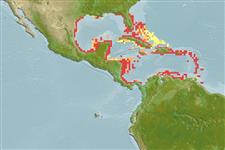Teleostei (teleosts) >
Blenniiformes (Blennies) >
Blenniidae (Combtooth blennies) > Salariinae
Etymology: Hypsoblennius: Greek, hypsi = high + Greek, blennios = mucus (Ref. 45335); invemar: Invemar (acronym) = in honor of the Instituto de Investigaciones Marinas de Punta Betin at Santa Marta, Colombia (Ref. 94455).
Environment: milieu / climate zone / depth range / distribution range
Ecology
Marine; demersal; depth range 1 - 5 m. Tropical; 30°N - 9°N
Western Atlantic: Louisiana, USA and the Gulf of Mexico (Ref. 13628) to Rio de Janeiro, Brazil (Ref. 57756).
Size / Weight / Age
Maturity: Lm ? range ? - ? cm
Max length : 5.8 cm TL male/unsexed; (Ref. 7251)
Dorsal spines (total): 12; Dorsal soft rays (total): 12; Anal spines: 2; Anal soft rays: 14. Head and usually pectoral fin base have orange spots on dark background. Black spot on side of head behind eye (Ref. 26938). Gill opening extending ventrally to below level of ventralmost pectoral-fin ray; segmented dorsal-fin rays 11 or 12; segmented pelvic-fin rays 4; last dorsal-fin spine 3.7 to 7.5% SL (Ref. 10696).
Adults live in attached, empty barnacle shells in clear waters, usually on pilings, buoys and rock ledges at or near surface. Recorded from oil platforms. Oviparous. Eggs are demersal and adhesive (Ref. 205), and are attached to the substrate via a filamentous, adhesive pad or pedestal (Ref. 94114). Larvae are planktonic, often found in shallow, coastal waters (Ref. 94114).
Life cycle and mating behavior
Maturity | Reproduction | Spawning | Eggs | Fecundity | Larvae
Oviparous, distinct pairing (Ref. 205).
Robins, C.R. and G.C. Ray, 1986. A field guide to Atlantic coast fishes of North America. Houghton Mifflin Company, Boston, U.S.A. 354 p. (Ref. 7251)
IUCN Red List Status (Ref. 130435: Version 2024-1)
Threat to humans
Harmless
Human uses
Tools
Special reports
Download XML
Internet sources
Estimates based on models
Preferred temperature (Ref.
123201): 24 - 28.2, mean 27.1 °C (based on 416 cells).
Phylogenetic diversity index (Ref.
82804): PD
50 = 0.5000 [Uniqueness, from 0.5 = low to 2.0 = high].
Bayesian length-weight: a=0.00776 (0.00356 - 0.01695), b=3.00 (2.81 - 3.19), in cm total length, based on LWR estimates for this (Sub)family-body shape (Ref.
93245).
Trophic level (Ref.
69278): 2.9 ±0.2 se; based on size and trophs of closest relatives
Resilience (Ref.
120179): High, minimum population doubling time less than 15 months (Preliminary K or Fecundity.).
Fishing Vulnerability (Ref.
59153): Low vulnerability (10 of 100).
Nutrients (Ref.
124155): Calcium = 640 [371, 1,528] mg/100g; Iron = 1.96 [1.09, 3.53] mg/100g; Protein = 17.4 [16.3, 18.4] %; Omega3 = 0.141 [0.066, 0.294] g/100g; Selenium = 29.1 [12.9, 68.4] μg/100g; VitaminA = 36.5 [11.1, 125.9] μg/100g; Zinc = 2.95 [1.96, 4.39] mg/100g (wet weight);
